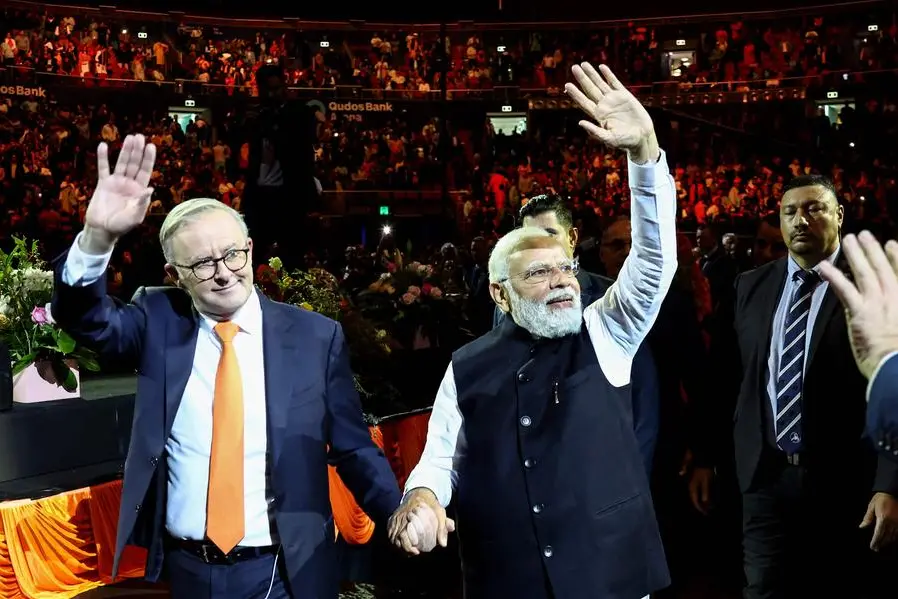PHOTO
Australia offered Narendra Modi a rock-star welcome Tuesday, during a visit by the Indian leader that was heavy on praise and light on his domestic controversies.
Modi hosted a 12,000-strong campaign-style in a Sydney arena Tuesday, with Prime Minister Anthony Albanese playing warm-up act and emcee.
Lured by the world's most populous market and a counterweight to China's growing military, diplomatic and economic clout, Australia's prime minister turned on the charm.
To chants of "Modi! Modi! Modi!" Albanese introduced his "dear friend" to a jazzed-up crowd of Indian-Australians, who he praised for making Australia "stronger and more inclusive".
"The last time I saw someone on the stage here was Bruce Springsteen and he didn't get the welcome that Prime Minister Modi has got," Albanese said.
"Prime Minister Modi is the boss!" he said, breaking into a broad smile and boasting the pair had met six times in the past year.
It was an unusually personal show of support for Modi -- a nationalist leader who faces re-election next year and has been criticised for sustained democratic backsliding and discrimination against India's hundreds of millions of non-Hindus.
Modi reciprocated his host's lavish welcome, offering a long list of interests that bind the two countries: from cricket to curry, yoga to Masterchef.
"The most important foundation of our ties is mutual trust and mutual respect," he said, promising trade between the two countries would double in the next five years.
Behind the flattery and mutual backslapping lie some hardheaded strategy and politics for both men.
As Australia struggles with a more assertive China, it is looking for economic and political partners in an increasingly rough-and-tumble neighbourhood.
India's economic performance has been mixed in the past decade, with missteps curbing growth. But hundreds of millions of people have been lifted out of poverty.
India is now the second-fastest growing economy in the G20 and a multi-trillion-dollar market.
And for both Modi and Albanese, the Indian diaspora offers a rich font of votes and campaign donations, according to Ian Hall, an international relations professor at Brisbane's Griffith University.
"What we saw with this joint appearance in Sydney is an intermingling of Australian and Indian domestic and foreign policy," he told AFP.
"Both leaders are looking for funds and support, with the Indian diaspora centre-stage, and using the bilateral partnership almost as leverage."
Indian-Australians make up the country's fastest-growing and second-largest diaspora, with 673,000 Indian-born citizens in a population of 26 million.
Almost 90,000 Indian students are enrolled at Australian universities, the largest overseas contingent after China.
- 'Blatant' targeting of minorities -
But Albanese's warm embrace of Modi has raised questions, too.
Under Modi "the world's largest democracy" has become much less free and more dangerous for his critics, according to Human Rights Watch's Elaine Pearson.
"Modi's Bharatiya Janata Party (BJP)-led government has been tightening its grip on civil society, using draconian laws to arrest and intimidate activists, journalists, opposition leaders, academics, peaceful protesters, and critics of government policies," she said.
Rights groups say India's 200 million Muslims have also faced increased discrimination and violence since Modi and his Hindu nationalist BJP swept to power in 2014.
"We are deeply concerned about his visit, and the manner in which he has been welcomed without any of the issues of concern in his own country being raised," Bilal Rauf, spokesperson for the Australian National Imams Council, told AFP.





















